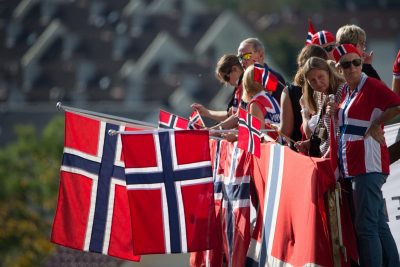NEWS ANALYSIS: Oil has long fueled Norway’s hugely successful welfare state, but now it’s helped knock the country off the top of the UN’s annual list of the world’s best places to live, when adjusted for “planetary pressures.” The UN is now taking countries’ carbon footprints and their impact on consumption into account, and both are viewed as harming the quality of life.

The UN list still puts Norway at the top of its Human Development Index when measured strictly in terms of prospects for “a long and healthy life, knowledge and a decent standard of living.”
When adjusted for the planetary pressures that include the climate crisis and collapse of biodiversity, however, Norway dove 15 spots down to a relatively lowly 16th place. Norway ranks as seventh-highest in the world in terms of its “material footprint per capita” of 37.9 tons of carbon equivalents. In terms of carbon emissions per person, Norway ranks among the 30 largest offenders at 8.3 tons per capita.
Ireland, which ranked second behind Norway last year, took over the newly measured top spot on the Human Development Index given its much lower material carbon footprint (21.5 tons) and lower carbon emissions per capita (8.1 tons). It was followed by Switzerland and the UK, despite the UK’s own oil industry. Ranked in terms of its contribution to planetary pressures per capita, the UK jumped 10 spots, thanks in part to its large population and relatively low emissions, less than a third of the US’ and Canada’s.
Norwegian leaders, especially those still firmly defending ongoing development of the oil industry, thus received a rude wake-up call Tuesday morning. Publication of the United Nations’ Development Programme (UNDP)’s annual “Human Development Report” has pushed them off their pedestal in terms of what the UN now believes is most important. Prime Minister Erna Solberg can no longer be able to claim that Norway is really best any longer, given the weight the UN is placing on Norway’s own carbon footprint which is especially large in terms of the country’s small population of just under 6 million.
New measurement methods
The UNDP revolutionized the way the world should view progress when it moved away from using economic growth as the sole measure of development in the 1990s. Human development, measured “by whether people in each country have the freedom and opportunity to live the lives they value” helped propel Norway into the top spot on the UN’s first such report and it has remained at or near the top since.
Now that “freedom and opportunity” also hinges on each country’s carbon footprint and other contributions to pressure on the planet, at a time “in which human activity has become a dominant force in shaping the planet.” The UNDP report stresses how many scientists believe that for the first time, “instead of the planet shaping humans, humans are knowingly shaping the planet.”

Norway, which has long tried to maintain a positive environmental and climate-friendly image, is known for generously funding other countries’ efforts to cut emissions or save rain forests. Until this past year, however, Norway’s own emissions have continued to rise as the country protected its oil and gas industry as its most important source of jobs and wealth.
Pressure has been growing on Norway, however, from the UN’s strong recommendations to shut coal operations on Svalbard (which Norway has done) and curtail its oil industry, especially in the Arctic. The Norwegian government has also had to defend itself against a lawsuit filed by climate-concerned citizens who claim Norway is violating their constitutional rights to a healthy environment, with a Supreme Court decision anxiously awaited.
A majority of Norwegian politicians on both the left and the right continue to defend the oil industry because of the jobs it creates, especially after the Corona crisis has cost so many in other industries like travel and tourism. The government can point to its global initiative to clean up the seas and cut transport emissions by promoting the use of electric vehicles. Its reluctance to save wolves and other predators under pressure from the farming lobby hurts its efforts to preserve biodiversity, however, and even state oil company Equinor realizes it can’t “greenwash” any longer. It’s now launching serious alternative energy projects.
Oil exploration continues, controversially
Yet oil exploration, not least into Norway’s Arctic regions, continues and is even encouraged. The new UNDP report is sending yet another message to the Norwegians to think differently, even while stressing their same old arguments that Norway’s oil and gas industry is much more environmentally friendly than other countries’ oil and gas industries. The Norwegians can also take comfort that their standing could have been worse: Iceland dove 26 spots because of per capital emissions higher than Norway’s, and Finland fell 19 spots. Other countries suffered much worse, with Luxembourg, Australia and Singapore among big losers under the new adjustments.
The UNDP’s measurement methods can likely be debated, but signal that climate and the environment have a major impact on human development. It was former Norwegian Prime Minister Gro Harlem Brundtland who first highlighted the need for sustainability at the UN in the late 1980s. She talked about “our common future” then, and now that future is here.
See the full UNDP report here (external link to the UNDP’s own website).
The countries now topping UNDP’s Human Development Index include Ireland in 1st place followed by Switzerland, the UK, Denmark, Sweden, Germany, New Zealand, Belgium and France. The US, meanwhile, fell a whopping 45 spots (from 17th to 62nd place) and Canada fell 40 spots (from 16th to 56th), also because of their overall carbon footprints.
NewsInEnglish.no/Nina Berglund

